ANEC-EDF webinar: an introduction to standardisationWe are delighted to be co-hosting a webinar with the European Disability Forum (EDF) that will provide an introduction to European standardisation. The webinar will highlight why standardisation is important for persons with disabilities and how they can get involved, as well as introducing the concepts, bodies, and procedures of European standardisation. The webinar will be held on Zoom on Tuesday 29 June 2021 from 15h30 to 17h00 (CET). For more information and to register, visit https://bit.ly/3vcJJLx. The language of the webinar will be English, with International sign interpretation and real-time captioning in English. We can also provide real-time captioning in other languages, but please indicate which when registering. |
Lead story
EC High Level Roundtable on the Chemicals Strategy
ANEC Secretary-General, Stephen Russell, has been appointed to the High Level Roundtable on the Chemicals Strategy for Sustainability (https://bit.ly/3hUdDQP).
At the first meeting of the Roundtable on 5 May, he presented the topics ANEC expects the Roundtable to address during its mandate.
He explained our interest in raising consumer protection from hazardous chemicals, notably on points we believe are not yet addressed in the implementation of the Chemicals Strategy. These include the development of a consistent approach to address chemicals in consumer products; the identification of gaps in the present regulatory frameworks for products, and the identification of product areas where further regulatory measures need to be taken. He gave further recommendations on the policy tools that could support the implementation of the Strategy.
Ahead of the meeting, we sent a first written contribution to the Roundtable with our views on the role of the Roundtable, the state of implementation of the Chemicals Strategy, and the industrial transition to safe and sustainable chemicals (https://bit.ly/3c06KK8).
ANEC expert, Claus Jørgensen, will act as our Sherpa in the Roundtable, with the support of the members of the ANEC Chemicals Project Team.

Horizontal
ANEC speaks at 2021Portugal.EU conference
On 11 May, the Portuguese Presidency of the EU Council and IPQ (the Portuguese national standards body) hosted a conference on how standardisation can aid the European economic recovery. The conference was opened by Thierry Breton, European Commissioner for the Internal Market, and Pedro Siza Vieira, Portuguese Minister of State for Economy and the Digital Transition. A recording is available on YouTube at https://bit.ly/3yHwR2c.
ANEC was honoured to be a panellist during the discussion, “Recovery with standardization: opportunities for the single market”. ANEC Secretary-General, Stephen Russell, reminded the audience that consumer spending made up 54% of EU GDP before the pandemic. For reasons of both economic and societal benefit, consumers therefore need to be at the centre of the digital and green transitions, helping drive the European economic recovery. He added the recovery need not be impeded by encouraging consumption in a sustainable and safe way. He also noted that standards have been key to protecting society during the pandemic and could continue to do so. Nevertheless, an inclusive European Standardisation System, which facilitates the participation of consumers and provides them with an effective voice, was essential in ensuring standards can play such a role.
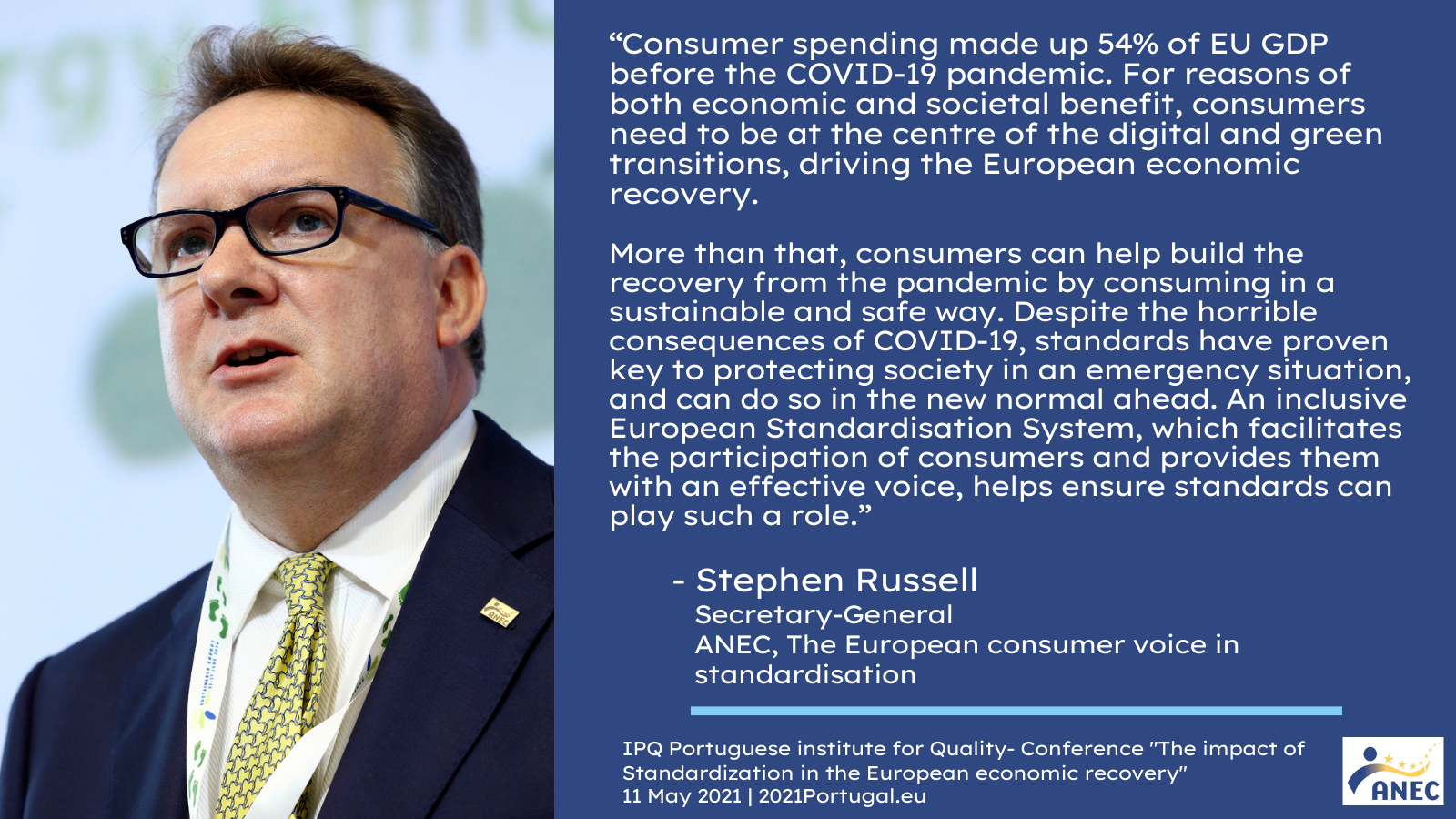
ANEC Vice-President at ISO/COPOLCO meetings
Vice-President Jens Henriksson represented ANEC at the meetings of the ISO Committee on Consumer Policy (ISO/COPOLCO), held from 4 to 6 May 2021.
The meeting began with an interactive forum, aimed at helping members contribute to ISO activities and engage with consumer interests in their countries. A further aim of the forum was to identify trends at national level which could be considered at international level.
During the plenary, Mr Henriksson reported on ANEC’s activities and achievements over the past 12 months, highlighting the importance of collective consumer participation in order to shape the drafting of European legislation and supporting standards.
For more information on the meeting, please visit https://bit.ly/3vxARR2.
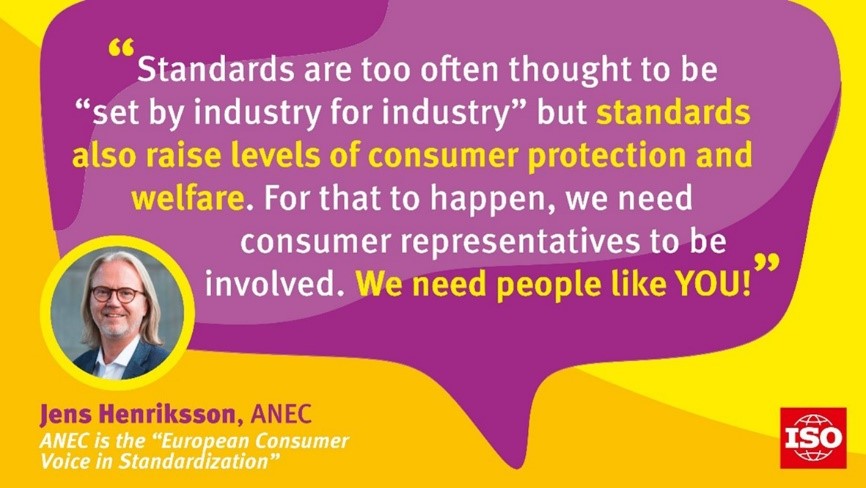
ANEC meets ASTM International
On 12 May, ANEC President Dermott Jewell and Deputy Secretary-General Chiara Giovannini met a high-level delegation from ASTM International to discuss issues of common interest. The ASTM delegation comprised President Katharine E Morgan; Vice-President Jeff Grove; Manager Molly Lynyak; and Director of European Affairs, Sara Gobbi.
Fruitful exchanges took place on consumer-relevant issues, such as the safety of connected consumer products and standards for barrier face-coverings. The discussions also covered means to increase consumer participation in standardisation.
New market surveillance actions launched
ANEC attended the online launch event on 17 March of the new EU joint market surveillance actions ‘CASP2021’, funded by EC DG JUST, as well as individual kick-off meetings in April.
Product-related activities of CASP 2021 include: Toys from non-EU web shops; Electric toys; Childcare articles (reclined cradles, baby swings, baby walkers); E-cigarettes and accessories; bicycle helmets & high visibility clothing (with or without LED features).
Horizontal activities of CASP 2021 focus on: Common risk assessment methodologies; Online market surveillance (policy related aspects, technological tools); Crisis preparedness.
Finally, a hybrid action will look into counterfeit goods and product safety.
The kick-off meetings of most product-related actions took place in April. ANEC attended the kick-off meetings on Toys from non-EU web shops on 27 April, and on Childcare articles on 28 April.
For the action on Toys from non-EU web shops, we drew the attention of the kick-off meeting to the report, “Is it safe to shop on online marketplaces?”, (https://bit.ly/3ww1QMG), which collates research by six national consumer organisations, under the coordination of ANEC’s sister organisations, BEUC and ICRT. For the action on Childcare articles, we presented an overview of our activities and our positions on the standards for these products.
Child Safety
Chemicals in toys
In April, ANEC published a position paper on the way forward for chemicals in toys (see https://bit.ly/3eX0Viu).
In the paper, we welcome the conclusions of the EC Staff Working Document from November 2020 on the evaluation of the Toy Safety Directive (TSD) (see https://bit.ly/3ylU0qP), which stated that "the Directive’s effectiveness is deficient in several points, in particular on chemicals" which "require urgent attention”. ANEC and BEUC have repeatedly pointed to these deficient provisions, even before adoption of the present TSD, Directive 2009/48/EC. Our view has been supported by several Member States.
In our view, particularly Article 46 of the TSD must be changed to allow for the establishment (or amendment) of provisions for all kinds of chemicals and for all kinds of toys, using a comitology procedure. We believe it important to broaden the scope of Article 46, not only with respect to the age range of children using toys, but also to ensure that the revised clause makes it possible to deal with all kinds of chemical provisions, not simply limits for specific substances. In addition, it must be ensured that the EC has the resources to regulate chemicals in toys effectively.
Safety of “kitchen helpers”
A range of children’s furniture products that could present serious hazards to young children was recently brought to our attention by our experts from APSI, the Portuguese Association for Child Safety Promotion. An online search for “kitchen helpers”, alias “learning towers”, suggests these products are widely available, including through e-commerce platforms (see https://amzn.to/3hDi9D7 for example).
Our analysis shows that the products themselves not only give rise to fall and entrapment hazards, but could also give rise to hazards by providing access to dangers such as thermal injuries, lacerations and poisonings when used close to kitchen work surfaces or bathrooms. As far as we know, these products are not covered by standards.
We therefore wrote to CEN/TC 207/WG2 ‘Children’s furniture’ with a request that it considers the safety of these products and develops proposals to reduce the risk of injury to children. The issue will be discussed at the next meeting of WG2.
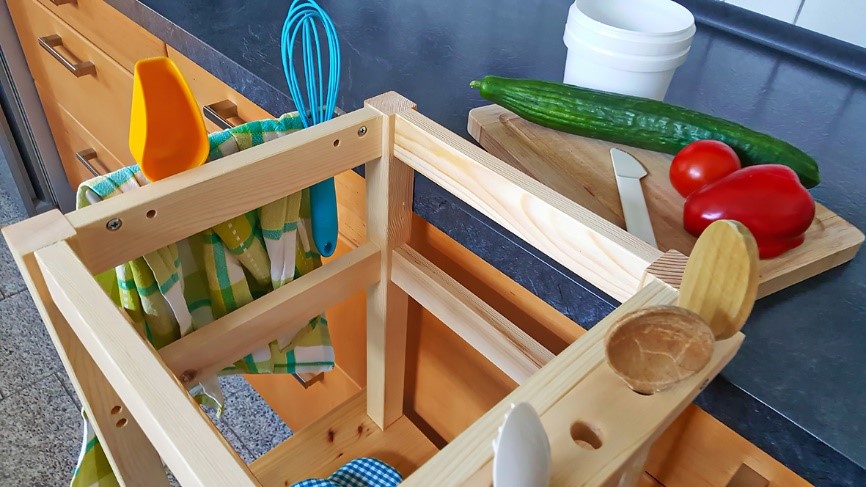
Trampoline parks
A common session of the ANEC Child Safety and Services WGs was held on 29 April 2021 to discuss the safety of trampoline parks and their standardisation.
Members were given a presentation of the recent ANEC Technical Study on Trampoline Parks (https://bit.ly/2M2rA18) by the contractors from the Faculty of Human Kinetics of the University of Lisbon, and APSI, the Portuguese Association for Child Safety Promotion.
During the second part of the meeting, members discussed prEN ISO 23659 ‘Trampoline Parks’, notably its provisions for dismount foam pits, high performance trampolines, safety briefings and supervision. The draft standard is currently out for Enquiry with a CEN deadline of 19 July. A small group of members from both ANEC WGs will develop the ANEC comments on the draft, taking into account the recommendations of the ANEC Technical Study.

Accessibility
Standards adopted on access to the built environment
ISO 21542 (Ed 2) ‘Building construction — Accessibility and usability of the built environment’ has been adopted at international level. Meanwhile, CEN has adopted both CEN/TR 17621 ‘Accessibility and usability of the built environment - Technical performance criteria and specifications’ and CEN/TR 17622 ‘Accessibility and usability of the built environment - Conformity assessment’.
ANEC supported the approval of ISO/FDIS 21542 (Ed 2), as it represents a more advanced state-of-the-art concept on the accessibility and usability of new buildings worldwide. We did nevertheless submit editorial comments, as a few requirements seem too low compared with existing national accessibility standards in Europe. We have proposed data is collected on these aspects and considered at the next review of the standard.
The two CEN Technical Reports were developed by CEN-CLC JTC 11, with the aid of a Project Team led by ANEC expert, Monika Klenovec. CEN/TR 17622 assesses compliance with the requirements in EN 17210 ‘Accessibility and usability of the built environment – Functional requirements’. Meanwhile, CEN/TR 17621 contains technical performance criteria to fulfil the functional requirements.
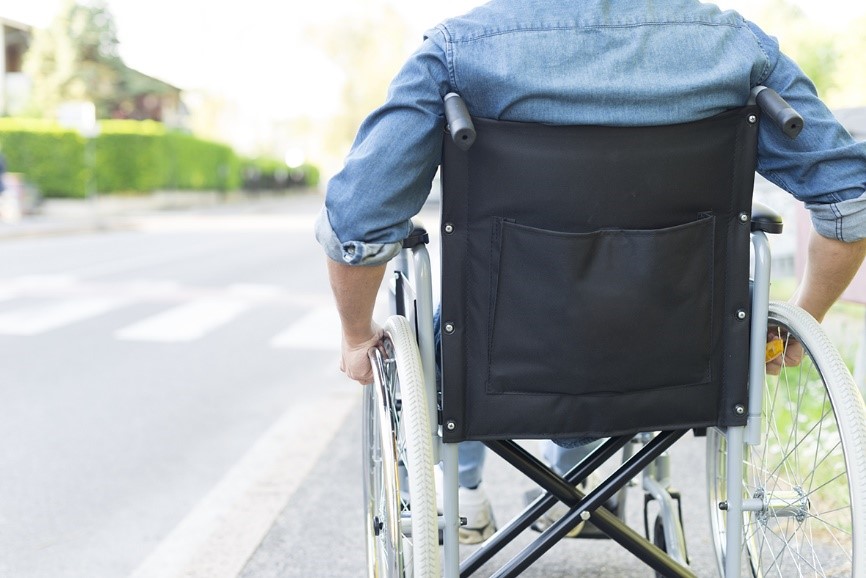
ANEC Accessibility WG meets
The ANEC Accessibility WG met on 26 April 2021. Experts discussed standardisation work on the access and usability of the built environment; access to the Information Society by older persons and persons with disabilities; assistive products & services, and eAccessibility.
Possible new items for ANEC, such as those under CEN/TC 293/WG13 ‘Tactile lettering’ were also discussed. The conclusions of the meeting identified action points intended to raise the accessibility of products and services through standards during the next months.
Domestic Appliances & Ecodesign
ANEC opposes draft SReq on space heating appliances
A draft Standardisation Request (SReq) on space heating appliances was submitted for vote to the members of the Committee on Standards in May. However, ANEC cannot support this SReq in its present form and urged Member States to vote against its adoption.
During the usual consultation of Annex III Organisations on the draft SReq, we submitted comments twice (in October 2019 and February 2021) to the EC, urging that the SReq be strengthened in addressing potential intoxication from carbon monoxide and the safety of vulnerable consumers. Unfortunately, the present draft SReq is unchanged in these aspects.
Digital Society
What role for standards in the Digital Services Act?
ANEC joined with BEUC on the issue of standards in the EC proposal for a Digital Services Act. We are concerned that Article 34 asks the EC to support and promote voluntary industry standards.
The use of standards in legislation and policy must follow specific rules on the elaboration of the standards in an inclusive way, according to Regulation (EU) 1025/2012. Consumer organisations contribute to the standardisation process, so we suggest that Article 34 should not promote voluntary industry standards, but standards that reflect a transparent, multi-stakeholder and inclusive process. The Regulation also contains provisions on identification of ICT specifications that are not national, European or international standards, but meet the requirements set out in its Annex II. We also base our request on the priorities of the Annual Union Work Programme for European Standardisation for 2021 which identifies the European standards and European standardisation deliverables that the EC plans to request this year. Its priority 20 addresses Online Platforms and refers to the Proposal for a Digital Services Act (see https://bit.ly/34m9IVC).
To read BEUC’s position on the Digital Services Act, please see https://bit.ly/3whZtgn. We address the issue of standards on page 29 (Article 34).
ANEC joins APPLiA webinar
On 21 April 2021, APPLiA hosted a webinar ‘Artificial Intelligence in the Digital Age’ in which ANEC Deputy Secretary-General, Chiara Giovannini, took part as panellist. A recording can be found on YouTube at https://bit.ly/3fHOzd2.
The webinar was opened by MEP Maria da Graça Carvalho who argued the need of industry for more flexibility and simplicity, and cautioned that over-regulation risks creating too many barriers to technological innovation. She stressed the crucial role the EU Institutions play in reaching the right balance between human rights and the right to technological innovation.
Ms Giovannini underlined the importance of adopting a human-centric approach to artificial intelligence, noting that AI is a means, not an end. She stressed that European values and principles should remain core to ensure asymmetries between consumers and industries are addressed at the policy-making level She said standards could be used to introduce values and principles in the design of products and services, underpinning legislation.
Paolo Falcioni, APPLiA Director-General, closed the panel by highlighting a shared vision to shape AI in Europe through “trustworthy innovation”.

New rules proposed on AI and robots
The EC has published two proposals that intend to address the risks from AI and improving safety to ensure users’ trust. The first is a Regulation on a European approach to Artificial Intelligence (https://bit.ly/3upVsVX) which intends to tackle the risks of AI while upholding an ambition to mould norms and standards that respect EU values and interests. The second is a proposed revision of the Machinery Directive (https://bit.ly/3oTFAtw).
ANEC has been contributing to both initiatives in the past months (our position paper on the Revision of Machinery Directive, https://bit.ly/3vubYFw; our position paper in answer to the EC consultation on the Impact Assessment for the AI proposal, https://bit.ly/3usHAdB).
The proposal for an AI Regulation will have impact on other product safety legislation, such as the Toys Directive and the Medical Devices Regulation. The AI proposal will be integrated into existing sectoral safety legislation to ensure consistency. It should be noted that certain AI applications would be prohibited from being put on the market, such as AI systems whose use would contravene EU values.
The revision of the Machinery Directive constitutes an example of how the AI regulation interplays with a sector-specific legislation. In addition, the revision covers other consumer-relevant aspects not linked to AI. From a first assessment of both proposals, we see that, while some of our points have been taken into account, others have not been accepted and will need to be reiterated in the legislative process that starts now.

“How can cybersecurity standards increase consumer protection?”
On 15 April, ANEC hosted an open webinar, “How can cybersecurity Harmonised Standards increase consumer protection?”, gathering panellists from ANEC, CEN-CENELEC, CECAPI, Eurosmart and ORGALIM. The webinar was held to discuss how Harmonised Standards could provide conformity to legislation, if data protection and security are to become mandatory requirements for putting products on the market. The EC is considering such an approach by requesting the development of standards under the Radio Equipment Directive.
During the webinar, ANEC stressed the importance of the consumer contribution in ensuring the requirements of a standard reflect the use of the product and reflect the environment in which the product will be used. Since 2017, we have been advocating to make privacy and security requirements mandatory for connected products in order to protect consumers from cyber risks. We believe the requirements need to be set by law, with a Standardisation Request providing the detail that the supporting Harmonised Standards must provide.
This was followed by a discussion revolving around cybersecurity standards being the best instruments to address cybersecurity risks; by providing state-of-the-art and best practices available to all manufacturers. It was agreed that consistency between a functional security approach and cybersecurity certification should be achieved.
The webinar concluded by recognising that standards are the key element to harmonise the technical product requirements through their references in NLF legislation, leaving freedom to set the level of technical detail, and being themselves the reference point Article 54 (1)c) of the Cybersecurity Act (https://bit.ly/3oWaS2Z).
Services
ANEC Services WG meeting
The annual meeting of the ANEC Services WG was held remotely in two separate sessions on 4 and 11 May.
On 4 May, our experts discussed activities on horizontal and inclusive services, and tourism services. Participants also heard about ANEC’s involvement in the planned CEN Workshop Agreement (CWA) on the Future of Social Responsibility.
On 11 May, DG SANTE updated experts on the directive on Patient Rights in Cross-Border Healthcare, and spoke about creation of a “Health Union” to manage future health crises. A BEUC colleague also joined us to present the latest on the Digital Services Act. Discussions moved on to our work on standards for e-commerce and sharing economy; quality of care for older people, patient involvement in person-centred care and aesthetic services; SEPA instant payment schemes, and sustainable finance.
We must thank ANEC Services WG Chair, Keith Lewis, as well as all our volunteer experts for their participation, dedication, and continued commitment.
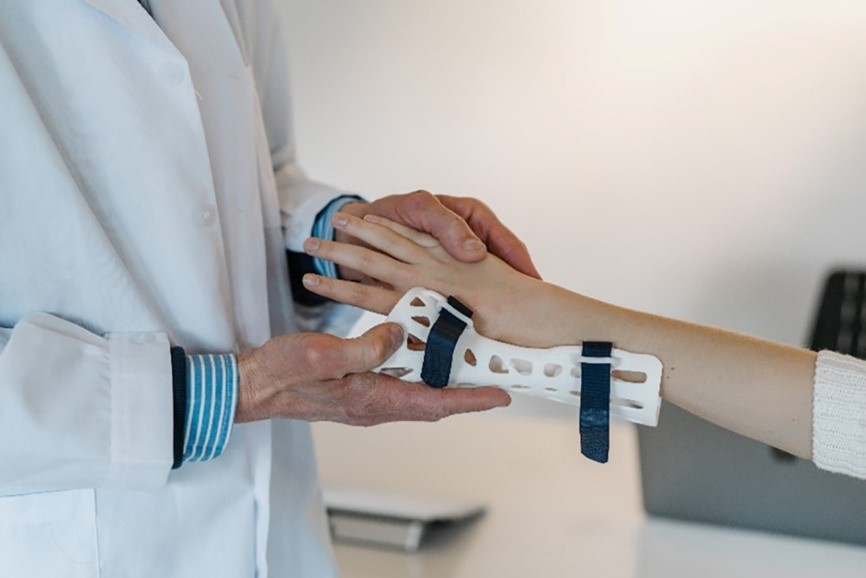
Reducing the spread of COVID-19 in the tourism industry
On 18 May, ISO published ISO/PAS 5643, ‘Tourism and related services — Requirements and guidelines to reduce the spread of COVID-19 in the tourism industry’. ANEC contributed to the development of the PAS which aims to support twenty tourism subsectors in providing safe services to consumers when re-opening.
In order to meet a request from the EC, CEN has endorsed ISO/PAS 5643 as CWA 5643-1, and has developed CWA 5643-2 which introduces a European Visual Identity to demonstrate compliance with Part 1 (see https://bit.ly/3u2nXso). ANEC also joined this work.

Traffic & Mobility
New EU Tyre Label - What you need to know
On 1 May 2021, new rules were introduced to improve and strengthen EU tyre labelling. The new label enables consumers to make better choices, allowing them to choose from a mix of criteria such as fuel efficiency, noise levels and wet grip performance.
ANEC has published an infographic on the new label: https://bit.ly/2Qzc8wk.
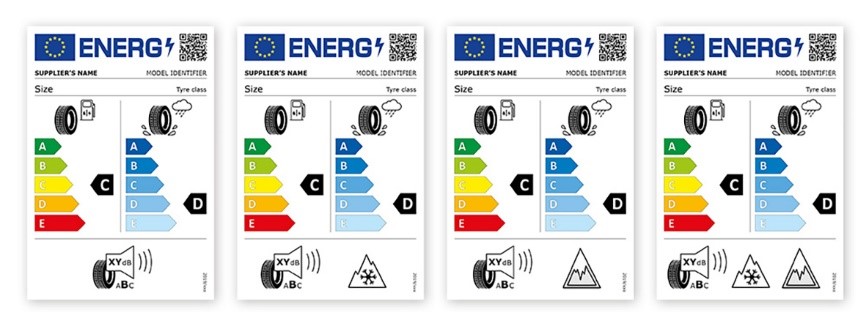
Smart Mobility & Sustainable Transport PT meets
On 18 May, our Project Team on Smart Mobility & Sustainable Transport met to discuss key topics, such as the new EU urban mobility framework, and the Delegated Regulation on Intelligent Speed Assistance. It also discussed the need for an EU database of all the possible scenarios of traffic signalling systems.
In Memoriam – Caroline Warne OBE
All in ANEC were saddened to learn of the passing of Caroline Warne on 22 March after a long illness. Caroline served as a member of our Coordination Committee in the late 1990s, but was best known for her work in championing the consumer movement, both nationally in the United Kingdom and internationally. Indeed, she served as a dynamic and innovative President of the ISO Committee on Consumer Policy (ISO/COPOLCO) from 2002 to 2006.
We pass our deepest condolences to her widower, Godfrey, her daughters and their families.

| List of meetings 2021 |
For comments or if you wish to write an article for the ANEC Newsletter, please contact: Marijana ANTAROROVA (This email address is being protected from spambots. You need JavaScript enabled to view it.).



